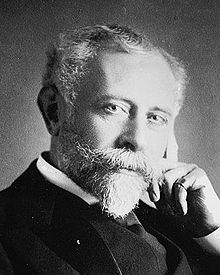Paul Cambon

Pierre Paul Cambon (20 January 1843 in Paris – 29 May 1924 in Paris) was a French diplomat and brother to Jules Cambon.
Biography[]
He was called to the Parisian bar, and became private secretary to Jules Ferry in the préfecture of the Seine. After ten years of administrative work in France as secretary of préfecture, and then as prefect successively of the départements of Aube (1872), Doubs (1876), Nord (1877–1882), he exchanged into the diplomatic service, being nominated French minister plenipotentiary at Tunis, fulfilling two terms as Resident-General.[1]

In 1886 Cambon became French ambassador to Madrid; was transferred to Constantinople in 1890, and in 1898 to London, where he served until 1920. [2] In London, Cambon quickly became an important figure, helping to negotiate the Entente Cordiale between Britain and France in 1904, and serving as the French representative at the London Conference which resolved the Balkan Wars between 1912 and 1913. Upon the outbreak of the First World War, Cambon helped secure British intervention on the French side. He was also the French signatory to the Sykes-Picot Agreement.
He was decorated with the Grand Cross of the Légion d'honneur, and became a member of the French Academy of Sciences.[1]
See also[]
References[]
- ^ Jump up to: a b Chisholm 1911.
- ^ "Sitter: His Exellency Monsieur Paul Cambon (1843-1924)". Lafayette Negative Archive.
- This article incorporates text from a publication now in the public domain: Chisholm, Hugh, ed. (1911). "Cambon, Pierre Paul". Encyclopædia Britannica (11th ed.). Cambridge University Press.
External links[]
![]() Media related to Paul Cambon at Wikimedia Commons
Media related to Paul Cambon at Wikimedia Commons
- 1843 births
- 1924 deaths
- Politicians from Paris
- Prefects of France
- Prefects of Aube
- Prefects of Doubs
- Prefects of Nord (French department)
- Ambassadors of France to Spain
- Ambassadors of France to the Ottoman Empire
- French residents-general in Tunisia
- Ambassadors of France to the United Kingdom
- Grand Croix of the Légion d'honneur
- Honorary Knights Grand Cross of the Royal Victorian Order
- 19th-century French diplomats
- 20th-century French diplomats